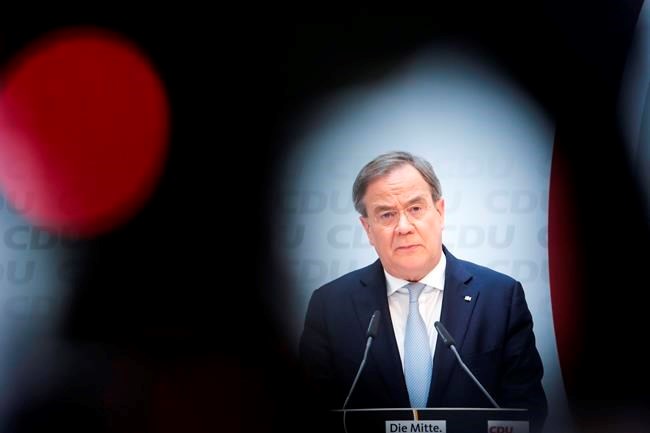BERLIN — The head of Chancellor Angela Merkel's party, Armin Laschet, on Monday rallied his party's leadership behind his bid to become the
That gave Laschet an initial advantage, but a rival who also has declared his ambition, Markus Soeder, resisted pressure for a immediate decision on who will run for chancellor in the Sept. 26 election, and pointed to his superior poll ratings.
The conservative Union bloc wants to resolve the question after months of shadow-boxing between Laschet, the head of Merkel's Christian Democratic Union, and Soeder, who leads its smaller Bavarian sister party, the Christian Social Union.
Laschet and Soeder — the governors of Germany's two most populous states, North Rhine-Westphalia and Bavaria respectively — both officially declared Sunday that they're prepared to run, but insisted they will find a harmonious solution. They didn't specify how.
Both have advantages and disadvantages: Soeder's poll ratings are much stronger, but Laschet is the recently elected leader of by far the bigger party.
“The picture (in the CDU leadership) is clear,” the CDU general secretary, Paul Ziemiak, said after a lengthy meeting Monday. “There is a broad majority for Armin Laschet as the chancellor candidate of the CDU and CSU.”
The party stopped short of a formal decision, however.
“Everyone wants a quick decision,” Laschet told a news conference. “All the facts are on the table. The problems we have to solve ... are so big that we shouldn't occupy ourselves any longer with our internal issues.”
Laschet’s support in the CDU is a decisive factor because his party runs in 15 of Germany’s 16 states, while the CSU runs only in Bavaria. The CDU's relatively weak local branch in Berlin backed Soeder. Some lawmakers also have backed him in recent weeks.
Soeder said Sunday he is ready to run “if the CDU — which is the bigger sister, that's very clear — supports this broadly.” He added that, if the CDU decides otherwise, "we would accept that.”
Soeder, 54, said the candidate should be the one with the best chances in the election, in which Merkel isn't seeking a fifth term after 16 years in power. That underlined his strength in polls after cultivating an image as a decisive backer of tough action in the coronavirus pandemic.
Soeder, who won his own party leadership's backing in a separate meeting Monday,
“Polls aren't everything, but they are a ... clear indication of what the population thinks, and we can't uncouple ourselves from the majority of people in our country,” he said in Munich.
Soeder said there needs to be more discussion on the candidate with more than just top party officials but it shouldn't be an “endless process.” He expects a result this week.
Laschet said, in Monday's CDU meeting, “everyone made clear, and everyone had countless examples, how polls can change in the shortest period of time.”
Laschet, 60, was elected CDU leader in January. He hasn’t enjoyed a honeymoon, most recently garnering criticism for appearing to dither over how to tackle a resurgence in virus cases. Last month, the CDU lost two state elections. National polls have shown the Union giving up gains it made thanks to Merkel’s management of the early stages of the coronavirus pandemic.
It has been hurt among other things by a slow start to vaccinations and allegations that several CDU and CSU lawmakers profited from business deals last year as Germany scrambled to secure masks.
The Union still leads national polls ahead of the environmentalist Greens and the
Soeder's CSU twice before provided the
Geir Moulson, The Associated Press



